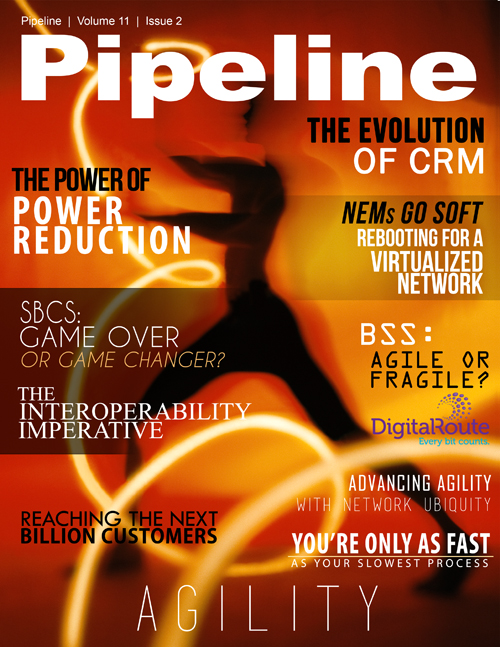Service Agility: You're Only as Fast as Your Slowest Process
By: Becky Bracken

Practically every network investment by operators these days is focused around updates that make it quicker, easier, more efficient and more profitable to roll out new services. From marketing and billing to policy and provisioning, operators and CSPs around the world are taking a hard look at the smartest way to evolve into an organization that can respond in real time to user needs and demands.
The days of the marketing department calling the engineering team to discuss whether a new service was possible are way over. Now teams of IT staff are feverishly working to make sure the network is ready for whatever any marketing director armed with KPIs, or customers filled with increasing demands, can throw at it. It's the dream of the fully agile network, and it's here.
“As we start looking at a truly agile network, what we see for the first time is a network on demand,” Ericsson's Grant Lenahan, Executive Directior, Innovation, Software Business Unit says. “We need to recognize we have a technology change; a set of innovation possibilities that previously didn't exist. Broadband-on-demand, now we have the technology, and that changes a lot.”
About Ericsson
Ericsson provides industry-leading OSS/BSS solutions and professional services, based on the deepest and broadest experience in the business. With the agility to help you realize your tomorrow today, our solutions and services are helping operators around the world succeed in the Networked Society. This means being fast, flexible and in control, delivering great experiences to consumers, operating efficiently and developing innovative new offerings for a diversifying market. In a world where mobile, broadband and the cloud are fueling a fundamental transformation, managing the subscriber lifecycle and experience will become even more important and challenging. Look to Ericsson to support your modernization and integration efforts across the full OSS/BSS landscape. www.ericsson.com/ossbss
Most of the action lies in antiquated OSS and BSS systems which hinder operators worldwide from providing better, more flexible and newer services at a manageable cost.
Virtualization and major OSS and BSS overhauls being launched across the world indicate how serious operators are about becoming more agile. From Telenor's June announcement it will lean on Tata to upgrade its Norwegian fixed-line OSS to Nokia's work overhauling Zain Kuwait's OSS systems to Tech Mahindra, and Comptel's launch of a Center of Excellence (CoE) established to guide telcos through their OSS and BSS transformations, the telecom industry is squarely focused on jettisoning clunky systems which slow down innovation.
“Comptel is excited to drive the fulfillment market forward in partnership with Tech Mahindra,” Antti Koskela, CTO, Comptel said in announcing the Center's opening. “We’ve had the technology and significantly strengthened our project delivery ability. Now, this CoE will help bring to life the efficiency and other operational improvements that CSPs have longed to achieve. We are at the ready to guide CSPs’ through their complex OSS/BSS transformation projects.”
Ericsson announced early in 2014 that it was merging OSS and BSS into a single Service Agility business center, and has since signed on customers including CenturyLink, which is looking to beef up its Customer Experience Management (CEM). This reflects the ever-growing complexity of these systems and the increasing interplay between the two. As real-time provisioning, billing, customer care, policy and control continue to be called upon simultaneously to meet ever more complicated network demands, the lines between OSS and BSS are becoming ever more blurred.
Consider a customer calling up a broadband service in real time, for instance. From authentication to billing, provisioning and customer-facing interaction, the dizzying acrobatics required of OSS and BSS systems to complete these real-time, on-demand transactions makes the old siloed, rigid systems of yesterday seem positively Midevil.




















